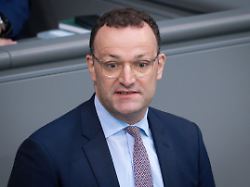“Economic Turnaround”
Spahn wants to cap “non-performance” social security contributions
8/20/2023 7:43 am
The CDU is still working hard on its new basic program. Union faction vice Jens Spahn now gives new insights into the direction of march. He calls for an upper limit for social security contributions and a “serious” dismantling of democracy. He also has something to say about migration policy.
Union parliamentary group leader Jens Spahn calls for a limit for social security contributions anchored in the Basic Law. “We need a load brake at 40 percent social security contributions,” said Spahn of the “Bild” newspaper. “The traffic light parties should decide on this brake together with the Union and – like the debt brake – enshrine it in the Basic Law. So that this net guarantee for salaries is also permanently observed.” Spahn added: “Contributions to health and long-term care insurance are increasing, pensions are becoming more expensive, and unemployment is increasing.” The current level of social security contributions is inimical to performance. It prevents growth and burdens employees and employers.
Spahn is also insisting on relief for income tax. “Performance must be worth it again. Overtime should be tax-free. In addition, a skilled worker with an annual salary of 62,000 euros already pays the top tax rate. In future, this should only apply from 80,000 euros.” It should be noted here, however, that according to the wage atlas, the median gross income of a skilled worker, which usually means craftsmen, is up to 50,000 euros a year. Spahn’s regulation refers to top earners, i.e. around four million of the 40 million taxpayers.
Change of course in migration policy
At the same time, Spahn called for “an economic policy change” in Germany. “Growth must have priority. Everything else must take a back seat,” said the CDU politician. “The electricity tax must go down immediately, investments need faster depreciation.” In addition, the bureaucracy must be “finally seriously” reduced.
Spahns also advocated a change of course in migration policy. “Germany needs a break from this completely uncontrolled asylum migration,” he said. “Experience shows that we cannot significantly reduce the numbers through deportations. That’s why we need a clear signal at the EU’s external border: nobody can go any further on this path.”
The integration of people traumatized by war or violence into society and the labor market takes time and a lot of resources. “This can only work well if the number of additional asylum seekers decreases significantly.” If the border protection works, Europe could “certainly take in and distribute 300,000 to 500,000 refugees a year via quotas.”
